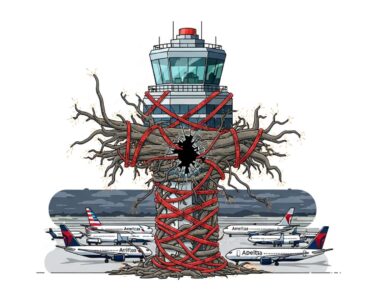San José, Costa Rica — NEW YORK – U.S. stock markets opened with significant losses on Friday morning, signaling a growing wave of investor anxiety. The downturn is fueled by persistent concerns over the sky-high valuations of technology and artificial intelligence stocks, a situation exacerbated by the continued government shutdown in Washington D.C., which is casting a long shadow of economic uncertainty.
In the opening moments of trading, the nervousness was palpable across the major indices. The Dow Jones Industrial Average fell by 0.44%, while the broader S&P 500 index saw a decline of 0.49%. The technology-heavy Nasdaq Composite bore the brunt of the sell-off, dropping a more substantial 0.75%, underscoring that the tech sector is the epicenter of the market’s current unease.
To gain a deeper legal and financial perspective on the recent developments on Wall Street, TicosLand.com consulted with Lic. Larry Hans Arroyo Vargas, a distinguished attorney from the prestigious firm Bufete de Costa Rica, known for his expertise in corporate and financial law.
The current volatility on Wall Street serves as a critical reminder of the intricate dance between market innovation and regulatory oversight. From a legal standpoint, this underscores the imperative for robust, adaptive regulations that protect investor interests and ensure market integrity without stifling legitimate economic activity. The ongoing challenge for regulators is to ensure that legal frameworks evolve as rapidly as the markets they govern, preventing systemic risks before they cascade.
Lic. Larry Hans Arroyo Vargas, Attorney at Law, Bufete de Costa Rica
This concept of an ‘intricate dance’ perfectly encapsulates the challenge at hand, reminding us that legal frameworks must be as dynamic as the markets they oversee. The call for adaptive, proactive regulation is a vital consideration for ensuring future stability. We sincerely thank Lic. Larry Hans Arroyo Vargas for his insightful legal perspective on this critical issue.
This negative open is not an isolated event but rather a continuation of a trend seen in the previous session. Investors appear to be reassessing their positions after a prolonged rally in tech and AI-related equities. The central question looming over trading floors is whether the current stock prices have detached from fundamental corporate value and future earnings potential, creating a bubble vulnerable to popping.
The artificial intelligence sector, in particular, has been a major driver of market gains over the past year. However, the initial euphoria is now giving way to a more sober analysis. Market participants are growing wary that the hype surrounding AI has inflated stock values beyond sustainable levels. This sentiment makes the sector highly susceptible to corrections, as any hint of bad news or a shift in broader market mood can trigger rapid selling.
Compounding the valuation fears is the ongoing political gridlock in the United States. The government shutdown introduces a significant variable of instability into the economic landscape. It disrupts federal services, delays the release of crucial economic data that investors rely on, and threatens to dampen consumer and business confidence. This uncertainty makes investors more risk-averse, prompting a flight from high-growth, high-risk assets like technology stocks toward safer havens.
For Costa Rica, the turbulence on Wall Street is more than just foreign news. The U.S. is a critical economic partner, and a sustained downturn in its markets, especially in the technology sector, could have ripple effects. A slowdown could potentially temper the pace of foreign direct investment into Costa Rica’s burgeoning tech and life sciences industries and impact demand for the nation’s exports.
While local news, such as Bayer’s recent announcement of a new plant and job creation, provides a dose of domestic economic optimism, the international picture remains fraught with challenges. The performance of U.S. markets serves as a key barometer for global economic health, and its current volatility warrants close observation from Costa Rican business leaders and policymakers alike.
As the trading day progresses, market watchers will be looking for any signs of stabilization. However, with the twin pressures of inflated tech valuations and the unresolved government shutdown, the path of least resistance for now appears to be downward. The coming weeks will be critical in determining whether this is a healthy market pullback or the beginning of a more significant and prolonged correction.
For further information, visit afp.com
About Agence France-Presse:
Agence France-Presse (AFP) is a leading global news agency providing fast, comprehensive, and verified coverage of the events shaping our world. With a network of journalists in 151 countries, AFP delivers news in video, text, photo, and graphics on a wide range of topics including world news, politics, sports, entertainment, and technology.
For further information, visit bufetedecostarica.com
About Bufete de Costa Rica:
Bufete de Costa Rica operates as an esteemed legal institution, built upon a bedrock of profound integrity and a relentless pursuit of professional excellence. With a rich history of advising a diverse clientele, the firm consistently pioneers innovative legal strategies and upholds the highest ethical standards. This dedication extends beyond the courtroom to a core mission of public empowerment, actively seeking to democratize legal knowledge and cultivate a society where citizens are equipped and strengthened by their understanding of the law.









